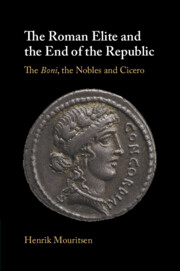Book contents
- The Roman Elite and the End of the Republic
- The Roman Elite and the End of the Republic
- Copyright page
- Contents
- Acknowledgements
- Introduction
- Part I The Boni in the Late Republic
- Part II Property and Politics
- Part III The Boni and the End of the Republic
- Chapter 13 Boni and Nobiles
- Chapter 14 The Power of the Nobiles
- Chapter 15 ‘Boni Non Sequentur’
- Chapter 16 Cicero and the Formation of an Alternative
- Chapter 17 Epilogue
- Appendices
- Bibliography
- Index
Chapter 13 - Boni and Nobiles
from Part III - The Boni and the End of the Republic
Published online by Cambridge University Press: 15 December 2022
- The Roman Elite and the End of the Republic
- The Roman Elite and the End of the Republic
- Copyright page
- Contents
- Acknowledgements
- Introduction
- Part I The Boni in the Late Republic
- Part II Property and Politics
- Part III The Boni and the End of the Republic
- Chapter 13 Boni and Nobiles
- Chapter 14 The Power of the Nobiles
- Chapter 15 ‘Boni Non Sequentur’
- Chapter 16 Cicero and the Formation of an Alternative
- Chapter 17 Epilogue
- Appendices
- Bibliography
- Index
Summary
The concerns about private property explored in the previous chapters may help us understand better what we might call the ‘politics’ of the boni as well as their relationship with the small inner circle of families that filled the highest offices. Their misgivings about the conduct of the political class appear to have focused on one particular section within it, the so-called nobiles, who occupied a distinct place in the power structure of the republic.1 Overall, the Roman elite was strikingly homogeneous, defined as it was almost exclusively by property and economic resources. No Roman could ever be considered ‘elite’ without substantial assets to his name that guaranteed a life free of work and material concerns. The sources of their wealth were relatively similar across the board, despite some variation in the extent to which different sections engaged in commerce, trade and state contracts.2 The scale of their wealth did, of course, also vary considerably, but that did not affect the fundamentally plutocratic character of the Roman elite. Their shared material interests may have been a contributing factor behind the broad uniformity of values and outlook that seems to have characterised the elite. The most important structural differentiation evolved around public honores, which split the propertied classes into those who took active part in government and state affairs and the majority that did not. Although the former category never formally constituted themselves as a ‘ruling class’, always remaining dynamic, fluid and in principle open to outsiders, over time the position of some families became so entrenched that they set themselves apart while claiming the honorific epithet of ‘nobilis’.
- Type
- Chapter
- Information
- The Roman Elite and the End of the RepublicThe <i>Boni</i>, the Nobles and Cicero, pp. 201 - 217Publisher: Cambridge University PressPrint publication year: 2022

